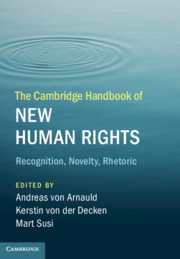Book contents
- The Cambridge Handbook of New Human Rights
- The Cambridge Handbook of New Human Rights
- Copyright page
- Contents
- Figures
- Contributors
- Acknowledgements
- Introduction
- Part I Cross-Cutting Observations
- Part II Public Good Rights
- The Right to Water
- Rights to Housing and to Land
- The Right to Health
- 8 The Right to Health under the ICESCR
- 9 Strong New Branches to the Trunk
- The Right to a Clean Environment and Rights of the Environment
- Part III Status Rights
- Part IV New Technology Rights
- Part V Autonomy and Integrity Rights
- Part VI Governance Rights
- Index
9 - Strong New Branches to the Trunk
Realising the Right to Health Decentrally
from The Right to Health
Published online by Cambridge University Press: 04 January 2020
- The Cambridge Handbook of New Human Rights
- The Cambridge Handbook of New Human Rights
- Copyright page
- Contents
- Figures
- Contributors
- Acknowledgements
- Introduction
- Part I Cross-Cutting Observations
- Part II Public Good Rights
- The Right to Water
- Rights to Housing and to Land
- The Right to Health
- 8 The Right to Health under the ICESCR
- 9 Strong New Branches to the Trunk
- The Right to a Clean Environment and Rights of the Environment
- Part III Status Rights
- Part IV New Technology Rights
- Part V Autonomy and Integrity Rights
- Part VI Governance Rights
- Index
Summary
There is little sweat in singling out the usual suspects in the work of others. One can always play the polite, yet petty nit-picker and identify holes of reasoning or important issues which were missed. This strategy makes easy targets of most texts, not infrequently doing injustice to the respective author’s intentions. More daring options pose the risk of exposing flanks of one’s own. The subject of this volume seems to invite daring endeavours of the latter sort. On this route, one may purport that the object of critique, not going far enough, falls short of its own ambitions. Moreover, one could question underlying conceptions, methodologies, approaches and biases, shoehorning in one’s own. An even more demanding task appears to be that of productive critique, of supplementing instead of subtracting. Pick your battlegrounds. Commenting on a grounded, well-balanced and measured critique of the UN institution’s recent work, of which Eibe Riedel used to be an active member, precipitates those more substantive break-out strategies if one does not want to parallel too closely the contribution one is tasked to add to.
- Type
- Chapter
- Information
- The Cambridge Handbook of New Human RightsRecognition, Novelty, Rhetoric, pp. 124 - 134Publisher: Cambridge University PressPrint publication year: 2020



